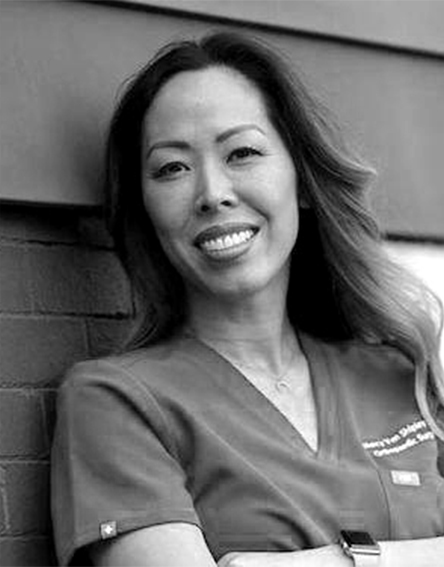The greeting card from a medical device sales rep hoping for a first-time meet and greet starts out innocuously enough. “Hi Sandy” it says, and goes on to say how he’s the new rep in the area, and that he’d like to set up a meeting. Is it a bit casual to address a physician in a professional setting by first name? Maybe. But it’s only when the card is held up side by side with a male colleague’s card from the same rep that it becomes clear what’s happening.

An image of this female surgeon’s greeting card next to her male colleague’s had gone viral on Twitter. In the picture, you can see the female surgeon is called by her first name, unconsciously stripped of her title by the author of the card. Whereas the male surgeon is addressed as one would expect in a professional introductory note, as “Dr.”.
What’s the big deal? Is that not her name? Is she so stuck up there on her high doctor-horse that she can’t come down and let someone call her by her first name? Is she so insecure that she can’t conduct business without being called Doctor? Does a greeting card really even matter that much?
Maybe she could just blow it off. Complain about about it, tell her other female doctor friends about it, and we could all groan and nod in agreement that this is BS and how the world isn’t fair blah blah blah and then keep our heads down, work hard (harder), and prove our worth with actions. Maybe she doesn’t ever call on this rep because of this slight, and he’d never know why other than perhaps she preferred some other company’s hardware more.
In this case, that’s not the route this surgeon chose. Sure, it was infuriating to see her card next to her colleague’s (and no, it matters not if he’s older, younger, meaner, less approachable). What she chose to do was call the rep and call him on it. The next day, a second card came, addressing her as Doctor, of course, but also with a heartfelt apology, and sincere expression that he holds her in the highest regard and to ask for forgiveness for the oversight. He noted it was an education, and that he wasn’t even aware of the mistake he had made. He thanked her for speaking up, and that it could have been easy to just have said nothing.
The sharing of these greeting cards on social media struck a nerve with many, as gender issues such as this generate a lot of heated discussion. Some comments felt the woman surgeon was over-reading the difference in salutation, suggesting woman are “more approachable” and thus don’t “need” the title. Or that being female made the rep more comfortable in using a first name (keeping in mind the rep had not met either surgeon prior). I was buoyed to see that a number of male physicians had positive comments, some shocked that this even occurs, as the male doctors are normally insulated from this unless in instances like this, the examples are placed right next to each other and it becomes obvious there’s a difference. Some comments vilified the rep and the company he works for, calling for heads to roll. It’s vitally important to point out that this is not the intention. The point is to increase awareness that this unconscious bias does exist, and in doing so, maybe we can all learn from it and be more proactive to prevent it. It’s also to point out that none of us are immune. Indeed, I myself have been guilty of asking a woman in the OR lounge if she was a PA, when she was actually a surgeon – and I immediately was mortified – even as the words left my mouth, before she had a chance to say anything. I of course apologized profusely, and though I’m not sure if she’s forgotten, I know I forever will remember this. I couldn’t believe it – even I,, in a field where only 6% of us are women – was guilty of unconscious bias too. I’ve been much more mindful when asking folks in healthcare what they do – being careful to put assumptions aside. It’s as simple as saying “Oh, you work in healthcare? What do you do?” instead of “Are you a doctor?” or “Are you a nurse?”.
I’ve personally encountered this issue as well, with patients, with hospital administrators. In one notable phone conference, a hospital administrator was leading a conversation involving multiple physicians, perhaps twenty or so and a number of other non-clinical individuals. At the beginning of the conference, each attendant identified him or herself, and their role. For example, I’d say “I’m Dr. Nancy Yen Shipley, orthopaedic surgeon in Portland, Oregon”. Through this meeting, it was apparent to me that while every single other physician (all male) were addressed as “Doctor”, I was referred to as “Nancy”. The significance of this did not escape me. I thought about it carefully, and a few days later, decided to call leadership. Even as a woman, his superior didn’t notice. It takes a little bit of heightened awareness to catch these things, and I don’t blame her. It was, as in the example above, well-received and I’ve not encountered this at least with that particular hospital administrator again.
Here’s an example of how one of my colleagues in the OR just knows the right way to navigate a professional and personal relationship. I have a very good friend who is my surgical assist. She has always called me Dr. Shipley in front of patients, but Nancy when not. She recognizes that it’s an issue of professionalism, and it creates less confusion who the doctor is.
It’s important to point out that this is not an ego thing. I feel it’s important to use these titles when in the presence of patients in the hospital setting, since I’ve been confused as a physical therapist, a nurse, nutrition services, janitorial support, a radiology tech. I’m not suggesting any sort of hierarchy here – but when the patient thinks the doctor hasn’t seen or talked to them about the surgery they’re about to have when indeed she has – then that affects informed consent. There’s a risk of perception that poor care and communication has been given or not at all. The patient has a right to know who is going to be performing surgery on them. Even if the mistaken identity arises from the patient’s own impressions and assumptions, it’s the physician’s duty to make sure this is corrected. I know some physicians who let it slide, introduce themselves, and if the mistaken identity goes on they just give up. In the cases where I’ve encountered this, I make it a point to be perfectly clear what my role is in their care.
I believe that in many of these situations, the offense is truly unconscious – not conscious – bias. Often, when unconscious bias is committed, when it’s called out, most reasonable people are pretty mortified, and I think in the greeting card case above, he was. Assuming that, I do think this particular person will be less likely to commit that mistake again. By just saying something and making this person aware of what power these tweaks in words and names have, this surgeon may have ever so slightly shifted something in the culture. Maybe minor now, but maybe of huge impact in the future. As this junior rep continues his career, surely he will encounter a few (maybe many) more female surgeons, none of whom deserve to have their 4 years of undergrad, 4 years of med school, 5 years of residency and likely 1 year of fellowship stripped in an instant. And I bet this surgeon has circumvented these future ladies of orthopaedics from having to experience this inequality.
Some say to not sweat the small things – to pick your battles. And I mostly believe that. In truth though, this is one of those small things, that’s actually a big thing.









